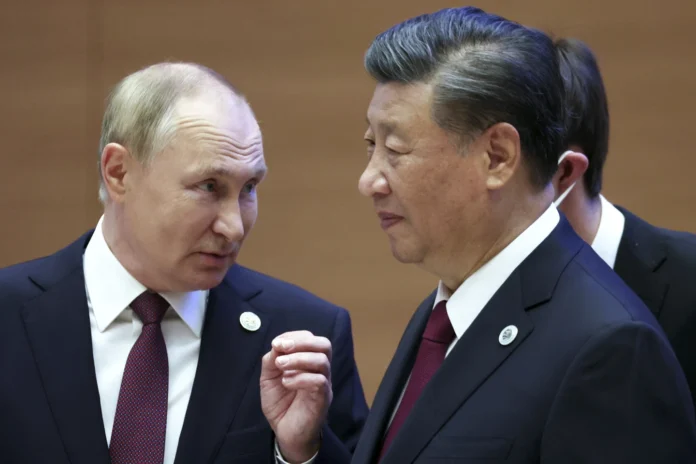New Delhi (AP) – President Vladimir Putin is set to participate in his inaugural multilateral summit since the armed rebellion led by the Wagner Group shook Russia earlier this year. The upcoming summit, known as the Shanghai Cooperation Organization (SCO) summit, will bring together leaders virtually on Tuesday. The SCO, founded by Russia and China, aims to foster cooperation and counterbalance Western alliances spanning East Asia to the Indian Ocean.
This year’s summit is being hosted by India, which became a full member of the SCO in 2017. For Prime Minister Narendra Modi, the event provides an opportunity to showcase India’s growing global clout and reinforce its role as a significant player in international affairs.
The SCO has traditionally focused on strengthening security and economic cooperation among member states, addressing challenges such as terrorism, drug trafficking, climate change, and the situation in Afghanistan following the Taliban’s takeover in 2021. While the recent conflict between Russia and Ukraine was not a prominent topic during the foreign ministers’ meeting in India last month, analysts believe that its implications for developing countries, particularly in terms of food and fuel security, remain a concern within the SCO.
The upcoming summit holds considerable importance for Moscow, as it seeks to demonstrate resilience and prove that the Western attempts to isolate Russia have been unsuccessful. The SCO includes four Central Asian nations—Kazakhstan, Kyrgyzstan, Tajikistan, and Uzbekistan—where Russian influence has traditionally been strong. In addition, Pakistan, which joined the SCO in 2017, and Iran, set to join on Tuesday, are also members of the organization, with Belarus awaiting approval for membership.
“This SCO meeting is truly one of the few global opportunities for Putin to project strength and credibility,” said Michael Kugelman, director of the Wilson Center’s South Asia Institute.
Notably, none of the SCO member countries have condemned Russia through United Nations resolutions; instead, they have chosen to abstain from voting. China has even sent an envoy to mediate between Russia and Ukraine, while India has consistently called for a peaceful resolution to the conflict.
For Putin, the summit presents a crucial opportunity to demonstrate his leadership and control over Russia, particularly in the aftermath of the short-lived insurrection led by Yevgeny Prigozhin, the chief of the Wagner mercenary group.
“Putin will want to reassure his partners that he is firmly in control and that the challenges to his government have been quashed,” commented Tanvi Madan, a senior fellow at the Brookings Institution.
The timing of the SCO summit, coming just two weeks after Prime Minister Modi’s pomp-filled state visit by U.S. President Joe Biden, may pose some challenges for India. However, India’s relationship with Moscow has remained robust throughout the ongoing conflict, with India heavily relying on Russian crude and sourcing 60% of its defense hardware from Russia. Simultaneously, the United States and its allies have actively courted India as a significant strategic partner to counterbalance China’s growing influence.
Balancing ties with both the West and the East is a key priority for India at the SCO summit. In September, India is also scheduled to host the Group of 20 (G20) summit, further emphasizing its commitment to engaging with both regions. Additionally, the SCO platform offers India an opportunity to deepen its engagement with Central Asian nations.
Observers believe that India will prioritize safeguarding its own interests during the summit. Key areas of focus are expected to include combating “cross-border terrorism,” which indirectly refers to Pakistan’s alleged support of rebels seeking independence for Indian-controlled Kashmir or its integration into Pakistan—a charge that Islamabad denies. India may also stress the importance of respecting territorial integrity and sovereignty, an issue often directed at its rival, China, with which it has been involved in an intense three-year standoff along their disputed border in the eastern Ladakh region.
Analysts assert that China, aiming to establish itself as a global power, is becoming a dominant player within forums like the SCO. In recent years, there has been increasing interest from countries such as Myanmar, Turkey, and Afghanistan to attain full membership, potentially posing challenges for Washington and its allies in the long run.
“The SCO presents a welcome alternative for countries that are uncomfortable with Western foreign policies, primarily due to the roles played by Russia and China. The expansion and influence of this group could be of concern to several Western capitals,” warned Kugelman.
As the SCO summit approaches, all eyes are on the outcomes and implications of this high-level gathering, as it has the potential to shape geopolitical dynamics and power dynamics in the region and beyond.






